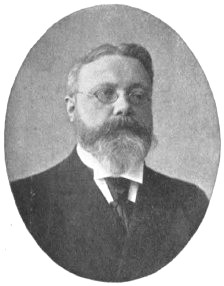Friedrich Jolly
Friedrich Jolly (1844–1904) was a prominent German neurologist and psychiatrist, known for his contributions to the field of neurology and for his work at the University of Strasbourg. Jolly's research and clinical work significantly advanced the understanding of various neurological disorders, and he is remembered for the Jolly test, a diagnostic procedure used in the assessment of myasthenia gravis.
Biography[edit | edit source]
Friedrich Jolly was born in 1844 in Heidelberg, Germany. He pursued his medical education at the University of Heidelberg, where he developed a keen interest in neurology and psychiatry. After completing his studies, Jolly worked in several hospitals, gaining experience in his fields of interest. His dedication and skill in neurology and psychiatry led him to a position at the University of Strasbourg, where he spent a significant portion of his career.
Throughout his career, Jolly made numerous contributions to the understanding of neurological diseases. He was particularly interested in the study of myasthenia gravis, a chronic autoimmune neuromuscular disease that leads to varying degrees of skeletal muscle weakness. The Jolly test, named after him, became a crucial diagnostic tool in identifying this condition. This test involves the application of electrical stimulation to muscles and observing the fatigue response, which is characteristic of myasthenia gravis.
Contributions to Neurology[edit | edit source]
Jolly's work extended beyond myasthenia gravis. He was involved in research on multiple sclerosis, epilepsy, and other neurological conditions. His approach to treatment was comprehensive, incorporating both medical and psychological therapies, which was innovative at the time. Jolly was also an advocate for the humane treatment of psychiatric patients, reflecting the evolving attitudes towards mental health care during his lifetime.
In addition to his clinical work, Friedrich Jolly was a dedicated educator, teaching the next generation of neurologists and psychiatrists at the University of Strasbourg. His lectures and publications helped shape the field of neurology and left a lasting impact on his students and colleagues.
Legacy[edit | edit source]
Friedrich Jolly's contributions to neurology and psychiatry are still recognized today. The Jolly test remains a part of the diagnostic criteria for myasthenia gravis, illustrating the lasting relevance of his work. Jolly's approach to patient care, which emphasized a combination of medical and psychological therapies, has influenced current practices in the treatment of neurological disorders.
Jolly passed away in 1904, but his legacy lives on through his contributions to medical science and his impact on the field of neurology. He is remembered as a pioneer in neurology and psychiatry, whose work has helped to improve the lives of countless individuals with neurological conditions.
Search WikiMD
Ad.Tired of being Overweight? Try W8MD's physician weight loss program.
Semaglutide (Ozempic / Wegovy and Tirzepatide (Mounjaro / Zepbound) available.
Advertise on WikiMD
|
WikiMD's Wellness Encyclopedia |
| Let Food Be Thy Medicine Medicine Thy Food - Hippocrates |
Translate this page: - East Asian
中文,
日本,
한국어,
South Asian
हिन्दी,
தமிழ்,
తెలుగు,
Urdu,
ಕನ್ನಡ,
Southeast Asian
Indonesian,
Vietnamese,
Thai,
မြန်မာဘာသာ,
বাংলা
European
español,
Deutsch,
français,
Greek,
português do Brasil,
polski,
română,
русский,
Nederlands,
norsk,
svenska,
suomi,
Italian
Middle Eastern & African
عربى,
Turkish,
Persian,
Hebrew,
Afrikaans,
isiZulu,
Kiswahili,
Other
Bulgarian,
Hungarian,
Czech,
Swedish,
മലയാളം,
मराठी,
ਪੰਜਾਬੀ,
ગુજરાતી,
Portuguese,
Ukrainian
Medical Disclaimer: WikiMD is not a substitute for professional medical advice. The information on WikiMD is provided as an information resource only, may be incorrect, outdated or misleading, and is not to be used or relied on for any diagnostic or treatment purposes. Please consult your health care provider before making any healthcare decisions or for guidance about a specific medical condition. WikiMD expressly disclaims responsibility, and shall have no liability, for any damages, loss, injury, or liability whatsoever suffered as a result of your reliance on the information contained in this site. By visiting this site you agree to the foregoing terms and conditions, which may from time to time be changed or supplemented by WikiMD. If you do not agree to the foregoing terms and conditions, you should not enter or use this site. See full disclaimer.
Credits:Most images are courtesy of Wikimedia commons, and templates, categories Wikipedia, licensed under CC BY SA or similar.
Contributors: Prab R. Tumpati, MD

